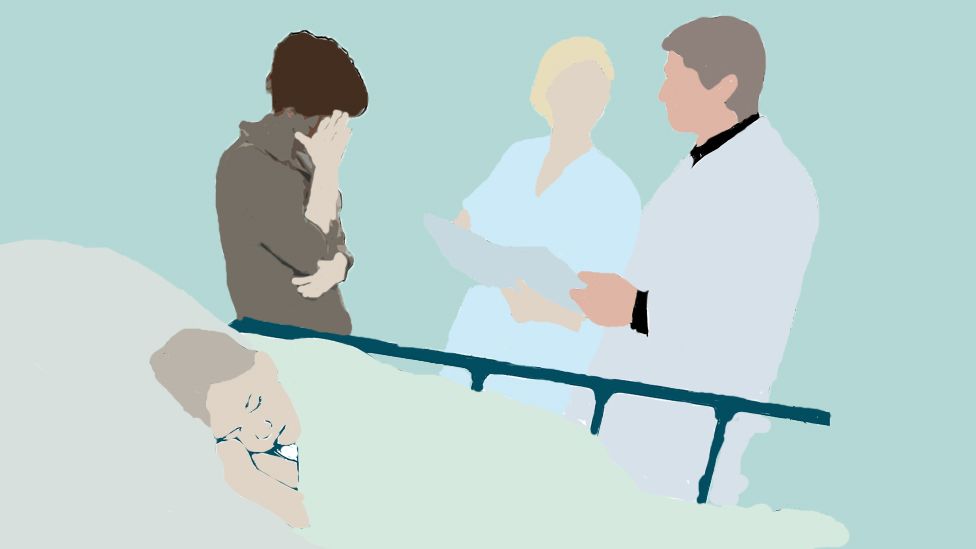Stopping conflict 'boiling over' at children's hospitals
- Published

In his final ruling on the distressing and tortuous legal case of baby Charlie Gard, the High Court judge said last month that mediation should be tried in all such cases.
Is it possible to defuse conflict between parents and hospital staff in these highly charged situations?
A project that began at Evelina Children's Hospital, in London, might hold some answers.
It has also been applied in Southampton, where the children's hospital was at the centre of a political and media firestorm three years ago.
Staff received hate mail and abusive phone calls after police were asked to search for a five-year-old boy with a brain tumour, who had been taken out of hospital by his parents.
Soul-searching
Ashya King's family had wanted him to have treatment abroad.
This was later paid for by the NHS - and his father has since announced Ashya is free of cancer.
Picking up the pieces from this crisis led to a lot of soul-searching in Southampton.
Dr Peter Wilson, the trust's clinical director of women's and children's services, told me: "We are seeing a rise in these kind of conflicts.
"Ten years ago, they were almost unheard of in paediatrics.
"But most NHS trusts at the moment will be dealing with something like this, as best they can, with the families.
"This isn't an isolated problem in Southampton. It's about how we do better as a healthcare system."
They are still analysing data from the six-month trial - but he thinks staff are now spotting five times more cases where there are early, subtle signs of discord with families.
Other children's hospitals are already hungry to learn from this work, which Southampton hopes to expand in the coming months.
Alarm bells
Maureen Wiltshire, who has 30 years' experience of nursing children, shows me a flowchart nurses and other staff use to identify warning signs of conflict.
It has two pages - but the second page of actions to help resolve problems has never been reached, because the first page has worked every time.
Ms Wiltshire said: "It might be a situation where staff would prefer not to look after that child because they feel they're being watched by the parent, or challenged all the time.
"We had a family of a young patient who was being moved to our ward.
"They were against the move, because they'd built up a relationship on the previous ward.
"One of the physios came to us and said the mum was worried her child wouldn't be safe.
"That was a real alarm bell that this was a situation with potential for breakdown.
"In the past, we'd have felt it was enough to get on with showing her that we were caring for her child safely.
"But we actually went in and had an early conversation which cleared up her worries, and stopped the problem getting any bigger."
Pressure 'boils over'
It sounds obvious, but this vital communication can get lost in an increasingly busy hospital environment.
The approach also includes asking parents whether they agree with notes recording difficult meetings.
The heartbreak in cases such as those of Charlie Gard and Ashya King is obvious - let alone the time and money involved.
Former BBC journalist Sarah Barclay set up a foundation specialising in medical mediation and training.
She has led the work at Evelina and in Southampton - and helps by bringing both sides together with mediation sessions if earlier steps to resolve the situation have failed.
Sarah said: "These situations can feel really tense.
"Parents are living out some of their most painful and difficult moments, in the hospital - a public space.
"So, everyone is under enormous pressure and sometimes it just boils over."
About 1,200 clinical and administrative staff at Evelina have had training as part of the Resolution Project.
Medical director Dr Sara Hanna said: "It might surprise people that children can spend more than a year in hospital continually.
"Once the trust is broken between the family and clinicians, it's almost impossible to get back.
"And then it's very dangerous for the child - because who is keeping their needs central at that point?"
- Published28 July 2017
- Published24 October 2014